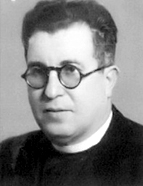

In this context, he also participated in and coordinated several collective works, including the compilation of Documentos sobre os portugueses em Moçambique e na África Central 1497-1840 [Documents on the Portuguese in Mozambique and Central Africa 1497-1840]. This publication relied on Silva Rego's diplomatic skills to expedite collaboration with African institutions and on the support of the newly established Calouste Gulbenkian Foundation (E. Axelson, ibidem pp. 56 and 57).
Silva Rego's work can be categorised into four areas: historical, historical-missionological, pedagogical-missionological, and theory of history studies. The first two categories serve as methods of analysis, explored, applied, and aimed to redefine concepts such as "colonisation", "missionisation", "Catholic mission", "acculturation", "encounter of cultures", "nationalism", "expansion-conquest", and "expansion-discovery". He focused his primary area of study on historical-missionological texts: the history of Portuguese expansion and patronage in the East and Africa during the modern era, occasionally extending to contemporary times. Many of these texts incorporated missionary theory, reflecting his own priestly experiences in the East. Pedagogical texts include the one he authored, for instance, for the Missionology course for ISEU students. In the final category — theory of history — he was particularly interested in the phenomena of time and action, exploring concepts such as "history-apprehension and knowledge of reality", "history-construction of the spirit", "history-the explanation of facts", and "history-life" (A. Silva Rego, ibidem pp. 11 and 12). He also advocated for the place of History within the social sciences and its autonomy from other disciplines such as philosophy (A. Silva Rego, "Da imparcialidade...", 1962, p. 140). He was also concerned with defining the historian's role and addressing the question of "impartiality in history", a theoretical framework to which he devoted an article with the same name (Idem, pp. 137-150). In his view, the historian was tasked with uncovering the historical truth that was attainable, even if not absolute, by employing a questionnaire that he believed should be nearly inexhaustible (A. Silva Rego, "Do tempo...", 1991, p. 13).
This work is financed by national funds through FCT - Foundation for Science and Technology, I.P, in the scope of the projects UIDB/04311/2020 and UIDP/04311/2020.
